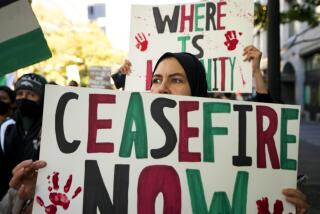Israel Frees Arab Held for 6 Years Without Charge
AL BIRAH, West Bank — Israel on Wednesday suddenly released a leader of a radical Palestine Liberation Organization faction after holding him without charges or trial for almost six years.
Ahmed Katamesh, believed to have been imprisoned longer than any other Palestinian under what Israel calls “administrative detention,” came home to this West Bank town to embraces from his wife and 8-year-old daughter and a shower of yellow blossoms from cheering Palestinian and Israeli supporters.
Looking fatigued, the bearded Katamesh said he was deeply moved to be free and home again among family and friends. But he also said he felt “great anger and distress” at the five years and nearly eight months he spent in prison without charges. He said his mother, father and a brother died during his imprisonment.
“I am angry that it is an official policy of the Israeli government to arrest Palestinians [and hold them] for years without specific charges,” Katamesh said. “This does not allow us to defend ourselves and is a violation of human rights.”
The case of Katamesh, 46, a writer and leader of the Popular Front for the Liberation of Palestine, or PFLP, became a cause celebre for Israeli and Palestinian human rights activists. It also was a symbol of the plight of an estimated 200 to 300 Palestinians and about 20 Lebanese now held without charges in Israeli prisons.
Israeli officials said the release of Katamesh and that of several other long-term Palestinian detainees in recent days came after each took a pledge not to engage in violent acts against Israel.
But the cluster of releases also is intended to help restore confidence among Palestinians in the long-stalled peace process, said an aide to Israeli Prime Minister Benjamin Netanyahu.
“It’s a goodwill gesture,” said David Bar-Illan, Netanyahu’s spokesman. “We decided to release them on condition that they publicly renounce terrorism, and this seemed like an appropriate time to do so.”
Israeli television news Wednesday evening showed Katamesh telling military authorities that he would not take part in violence against Israel. “My colleagues and I will not undertake any acts that affect the security of the Israeli public, directly or indirectly,” he said.
Quoting sources close to Shin Bet, Israel’s internal security service, Channel One television in Israel also reported that Katamesh was suspected of instigating terrorist attacks against Israelis, even from inside the Damoun prison near Haifa where he served his term.
But Jawad Boulos, Katamesh’s attorney, said his client was a political, not a military, leader. Boulos said the pledge that helped win Katamesh’s release was no different in substance from other statements he had made to Israeli authorities during his long imprisonment.
“Ahmed has been saying for years that he is not active in any violence and will not be in the future,” Boulos said. “He has always said that he is a writer and politician and that he will struggle politically, not violently, against the Israeli occupation and against the so-called peace process. This is the first time they were ready to accept this.”
The PFLP--a radical group with a secular, largely socialist philosophy--is among several PLO factions that oppose the peace agreements with Israel. It is believed responsible for numerous attacks on Israeli civilians, including a shooting last year that killed two Jewish settlers on the West Bank.
Israeli officials say administrative detention, first used by the British during the mandate period in Palestine before Israeli statehood, is a necessary tool to prevent terrorism against Israel. During the intifada, the six-year Palestinian uprising, thousands of Palestinians were held on administrative orders renewable every six months.
But human rights groups argue that detention without due process cannot be justified in a democracy, and they celebrated Katamesh’s release Wednesday as a significant step forward in their campaign to outlaw the practice in Israel.
Katamesh, whose home was decorated Wednesday with Palestinian flags and a large PFLP banner, was arrested there Sept. 1, 1992, after more than 16 years as a fugitive wanted by Israel. During his imprisonment, he wrote four books, ranging from political philosophy to children’s stories.
His wife, Suha Barghouti, 40, said her husband’s prison term was extended for six more months only two weeks ago. She credited recent efforts by Israeli and Palestinian activists for helping to win his release.
Zehava Galon, a prominent Israeli civil and human rights activist who visited Katamesh at his home Wednesday, said she had no doubt that recent public pressure on the government helped to free him. She and about 30 other Israeli writers, activists, doctors and lawyers recently formed a group called Open Doors that made Katamesh and 10 other detainees who had served more than three years the focus of a movement to end administrative detentions; eight of the 11 have been released, and Bar-Illan said the final three members would be freed in coming weeks.
“We are very excited that our public campaign has succeeded, but the procedure of administrative detention must be abolished altogether,” Galon said. “It has no place in a democratic country. We say to the security system: If you have something against someone, try them. If not, they must be released. We are opposed to the use of administrative detention as a means of punishment.”
But at least one organization opposed Wednesday’s release. The group, Victims of Arab Terror, issued a statement Wednesday warning that “the bill for Katamesh’s future terrorist attacks will be given to the leftist organizations that helped release him.”
More to Read
Sign up for Essential California
The most important California stories and recommendations in your inbox every morning.
You may occasionally receive promotional content from the Los Angeles Times.










